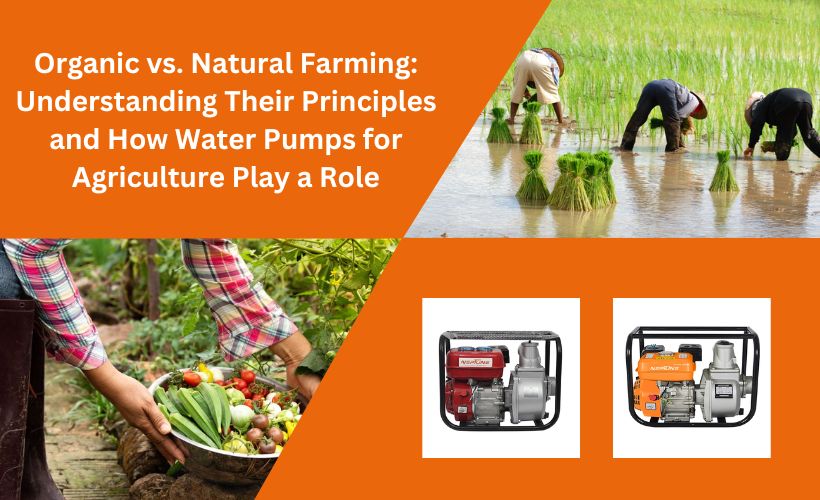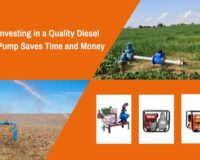Many are exploring alternative farming methods as environmental sustainability becomes a growing priority. Among the most popular are organic and natural farming. While both aim to harmonize with nature, they differ in their approaches. In this blog, we’ll explore the key differences between organic and natural farming and highlight the critical role of water pumps for agriculture in these practices.
Organic Farming: A Certified Approach
Organic farming follows a structured set of guidelines certified by government or independent bodies. It emphasizes the use of natural resources and avoids synthetic chemicals such as artificial fertilizers, pesticides, and GMOs. Organic farming strongly focuses on soil health, biodiversity, and animal welfare.
Key Aspects of Organic Farming:
– Soil Health: Farmers enhance soil fertility through crop rotation, cover crops, and composting.
– Biodiversity: The practice promotes beneficial insects and microorganisms for a balanced ecosystem.
– Animal Welfare: Organic livestock are raised humanely, with access to natural feed and pasture.
– Traceability: Organic products are carefully tracked from farm to table to meet certification standards.
Natural Farming: A Hands-Off, Holistic Approach
Natural farming, developed by Japanese philosopher Masanobu Fukuoka, takes a more flexible and minimal-intervention approach. Sometimes called “do-nothing farming,” it lets nature take control, with farmers intervening only when necessary.
Key Aspects of Natural Farming:
– Non-Intervention: Farmers avoid tilling, weeding, and external inputs like fertilizers and pesticides.
– Spontaneous Growth: Plants grow without interference, mirroring natural ecosystems.
– Symbiotic Relationships: Farmers foster natural relationships between plants, animals, and microorganisms.
– Observation-Based Decisions: Farmers make decisions based on natural cues observed in the environment.
The Role of Water Pumps in Organic and Natural Farming
Water is essential for all types of agriculture, including organic and natural farming. Water pumps, particularly diesel water pump for farming and agriculture motor pump systems, are vital for ensuring an adequate supply of water for irrigation, livestock, and processing.
How Water Pumps Support Farming:
– Irrigation: Pumps draw water from wells, rivers, or lakes, distributing it via systems like drip or sprinkler irrigation to nourish crops.
– Livestock Watering: A reliable diesel water pump for agriculture provides livestock with clean drinking water, ensuring their well-being.
– Processing: Pumps are also used to wash produce, assist in dairy pasteurization, and handle other processing activities.
Choosing the Right Water Pump
When selecting a water pump for agriculture, it’s important to consider:
– Water Source: The source of your water (well, river, etc.) will dictate the type of pump you need.
– Water Demand: How much water your farm requires for crops and livestock determines the pump’s capacity.
– Energy Efficiency: Opt for energy-efficient pumps to reduce costs and environmental impact.
– Durability: Ensure the pump can withstand long-term outdoor use and varying conditions.
Conclusion
Both organic and natural farming are sustainable practices that prioritize environmental responsibility. Though their methods differ, both rely heavily on efficient water supply systems, like diesel water pump for farming or agriculture motor pump systems. By choosing the right diesel water pump for agriculture and using it effectively, farmers can support their operations and contribute to a more sustainable future.
FAQ
Q1. What is the role of water pumps in organic and natural farming?
Water pumps are crucial in organic and natural farming by ensuring a consistent water supply for crops and livestock. They are used for irrigation, livestock watering, and even processing activities like washing produce or dairy pasteurization. Systems like water pump for agriculture and diesel water pump for farming are commonly used to draw and distribute water efficiently.
Q2. What types of water pumps are best for organic and natural farming?
The choice of water pump depends on factors like the water source, water demand, and energy efficiency. Common options include agriculture motor pump systems and diesel water pump for agriculture, both of which are capable of handling the irrigation and watering needs of organic and natural farms.
Q3. How can I ensure the water pump I choose is environmentally friendly?
To minimize environmental impact, choose an energy-efficient water pump for agriculture or a diesel water pump for farming that consumes less fuel and emits fewer pollutants. Additionally, selecting pumps that are durable and built for long-term use will reduce the need for frequent replacements, contributing to sustainability.




